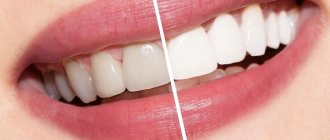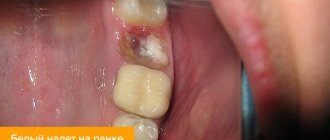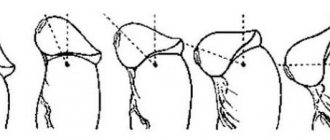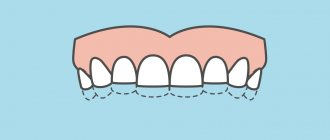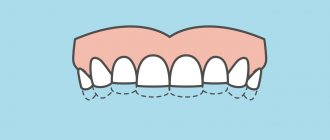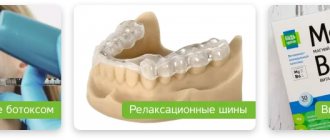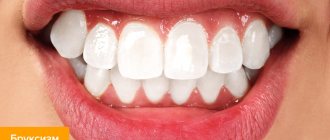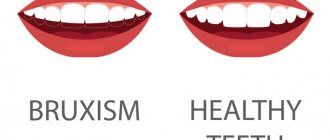Bruxism - what is it
Uncontrolled grinding of teeth, resulting from spasms of the masticatory muscles. If you come across texts about the Carolini phenomenon, odonterism, “teeth grinding disease” - they are all about bruxism, and the names listed are synonyms of bruxism. Translated from ancient Greek, bruxism means grinding.
Dentists distinguish two types of this disease.
- Directly grinding, that is, the friction of the teeth against each other.
- Clanching is a static clenching of teeth that occurs without friction.
Bruxism is often chronic, causing discomfort to a person for many years. If left untreated, it results in complications: problems with the temporomandibular joint, chronic stress, and abrasion of tooth enamel.
It is necessary to distinguish between childhood and adult bruxism - they have many significant differences. Here we will look in detail at the course of this disease in adults. There is a separate article on childhood “teeth grinding disease”.
Night grinding of teeth.
A person does not realize that he grinds his teeth when he sleeps. Doesn't wake up from gritting her teeth and may not be aware of the problem at all. Only his relatives can talk about it.
Daytime teeth grinding.
This type of bruxism is already recognized by a person. But clenching of teeth occurs involuntarily and cannot be controlled. During daytime bruxism, a person feels discomfort, which causes periodic strong tension in the facial muscles.
Why does the problem appear in children?
- malocclusion,
- bruxism as a reaction to a bad psychological “climate” in the family, kindergarten, school. Pathology may indicate an excess of impressions or the process of adaptation to something new (school, moving to another city). A small child grinds his teeth mainly because he has a fragile child's psyche. Until the age of 7, there is no need to worry too much about this, since after this age in most children the symptom goes away on its own. If it persists and repeats frequently, then you need to see a doctor.
- teething: when the baby’s milk elements are cutting, the baby’s gums become swollen and itchy, so whenever possible he tries to alleviate his condition. For example, he clenches his jaws tightly, rubs his teeth against each other in order to scratch the inflamed mucous membranes,
- heredity,
- inflamed adenoids,
- bad habit: some kids begin to deliberately grind while playing and trying out new sensations, and then it becomes a habit for them.
On a note! There is still a widespread belief that a child is infected with worms if he grinds his teeth while eating during the day and while sleeping at night. This theory is based on the fact that during infection with helminths, a person’s salivation increases, and he may begin to involuntarily move his lower jaw. However, the relationship between bruxism and worms has not been scientifically proven.
The most common consequences of teeth grinding in adults
- Increased tooth wear. Constant friction causes teeth to lose their natural height. In general, this is a natural process: with age, all people's teeth become a little shorter. But with bruxism this happens much faster. Plus, constant grinding of teeth results in frequent loss of fillings, the appearance of chips and roughness.
- Pain in the mouth. It appears due to the fact that during bruxism a person often “bites” his cheeks. Wounds and abrasions appear that do not have time to heal.
- Headache, nagging pain in the neck, ringing in the ears, dizziness. If the cause of these neurological symptoms cannot be substantiated by other diseases, then there is a high probability that these are the consequences of constant teeth grinding.
- Drowsiness, irritability, general “weakness,” fatigue. All this can appear if a person suffering from bruxism has trouble sleeping at night due to constant clenching of teeth during sleep.
A person himself can rarely understand that the cause of his health problems is bruxism. The diagnosis can be made only with the help of a special study - electromyography.
Prevention
Bruxism at an early age can be prevented. Parents are advised to reconsider their daily routine. The last meal should be no later than 2 hours before bedtime. From 4-5 months, the baby can be given to gnaw on an apple or carrot in the evening so that his muscles get tired and do not shrink outward.
During the day, parents control that the child does not make voluntary movements with his jaws, does not creak them, expressing negative emotions. Watching TV and staying in front of a computer or phone monitor is limited to 2 hours a day. Before going to bed, it is advisable to completely abandon such entertainment and devote time to quiet board games, a walk in the fresh air or reading books. In the evening, they try to maintain a positive emotional mood to ensure a restful sleep.
To prevent calcium deficiency, pediatricians recommend taking small doses of vitamin D from October to March. Infants up to one year old need it, but studies show that calcium deficiency occurs even at older ages. Therefore, schoolchildren can switch to calcium complexes with vitamin D or multivitamins.
From early childhood, children can be taught to visit the dentist and take proper care of the oral cavity. This helps reduce the risk of bruxism due to periodontitis or fillings.
Why do adults clench their teeth?
There is no clear answer. However, research and observations have allowed doctors to identify several hypotheses for the occurrence of bruxism.
- Bad habits
Sometimes, in order to concentrate, some people chew on a pen or toothpick. Over time, this action can become a conditioned reflex. And when a person needs to concentrate, he involuntarily clenches an imaginary toothpick between his teeth. This may explain the occurrence of teeth grinding during sleep. - Nervous stress
Often adults clench their teeth when they want to hold back in a stressful situation. If this happens for a long time, the body may develop an uncontrollable habit: the slightest overexertion - we clench our teeth tightly. This is another version of the appearance of bruxism at night in adults. - Neurological diseases
Also, people suffering from a number of neurological diseases often grind their teeth at night: epilepsy, tremor, enuresis, Huntington's disease, Parkinson's disease - all of them are characterized by such a symptom as bruxism. - Insomnia
If a person does not sleep normally for a long time, often wakes up at night, is more often in a state of shallow rather than deep sleep, he clenches his jaw uncontrollably because he begins to get nervous because he cannot get a good night's sleep. - Pathologies of the dental system
Bruxism can be caused by a pathological bite: it causes an uneven distribution of the load on the teeth. For treatment in this case, read the article “Bite correction in adults.” Also, the cause of clenching teeth at night may be their overcrowding. With this disorder, the teeth do not close completely. In addition, dentists studying the phenomenon of bruxism note that its cause may be the desire of people to “shorten” fillings or dentures that were installed incorrectly: a person tries to “erase” them and often begins to close their jaws tightly and move them relative to each other . Over time, this can become an unconscious habit.
For quite a long time, bruxism was considered a symptom of helminthic infestation. Scientific research has not confirmed this theory.
Children's teeth grinding
As for bruxism in children, this problem is sometimes temporary and goes away with age. This is due to teething. However, this should not be taken lightly. The formation and growth of permanent teeth is a process that ensures the normal functioning of the dentition throughout a person’s life. Therefore, you should consult a dentist to reduce the risk of malocclusion, prevent damage to the temporomandibular joint mechanism, and injury to gum tissue and teeth. When the child is over seven years old and at the same time:
- continues to grind his teeth frequently;
- there are signs of destruction of the crown part of the tooth;
- sore gums;
It is necessary to go to the dental clinic as quickly as possible so that the child can receive help. Otherwise, the problem will gradually develop into early and very painful tooth loss. One more point: teeth grinding is popularly considered a sign of helminthic infestation. Experts estimate that only 30% of children with bruxism have a problem with parasites. The remaining 70% do not have such problems. But in order to make an accurate diagnosis, it is still worth getting tested for eggworm in order to exclude this factor from a number of causes of bruxism.
Psychosomatic explanation of bruxism
Now one of the most common versions of teeth grinding is psychosomatic. That is, bruxism is the result of hidden experiences, long-suppressed emotions, complexes, and fears. All this can cause spasm of the chewing muscles. There is also an assumption that bruxism accompanies a number of mental disorders. Thus, scientists from Germany studying “adult” bruxism conducted a study, the results of which indicate that teeth clenching is directly related to chronic depression.
ATTENTION!
Confusion of the soul is the main cause of teeth grinding. This was the opinion of Hippocrates. And he was probably not far from the truth.
Causes of the condition
Why do they fasten their teeth together at night? Doctors consider psychological stress to be the main cause of the disorder. Doctors say that people prone to complexes, depression and neuroses more often suffer from the problem. A person experiencing anxiety tenses several groups of facial muscles, including the jaw. This provokes teeth grinding.
The causes of bruxism may lie in conditions that are more dangerous for a person. The symptom accompanies the early stages of epilepsy. Sometimes you can only understand by grinding your teeth that a micro-attack has begun. The disorder occurs when the trigeminal or fifth nerve is damaged.
Why do adults grind their teeth in their sleep? Other causes of pathology include:
- Bite abnormalities.
- Incorrectly installed fillings or dentures.
- Parasitic diseases – helminthiasis. There is an opinion that parasites, multiplying in the body, lead to vitamin B deficiency and, as a result, neurological abnormalities, manifested by bruxism and other symptoms (irritability, apathy, increased appetite). A person can get rid of the problem completely only after taking medications aimed at destroying the parasite.
Bruxism in adults can also occur due to cervical osteochondrosis and birth injuries.
Why do they grind their teeth during the day? Among the causes of the problem, scientists identify:
- Taking medications with a sedative effect.
- Poor nutrition.
- Long-term smoking.
- Taking drugs or alcoholic beverages.
Science has not yet revealed the dependence of bruxism on a hereditary factor, but the main consequences of the pathology are reliably known, which are manifested by: abrasion of tooth enamel, changes in facial proportions and facial expressions, insomnia, etc.
No Ads
Psychosomatics of bruxism
Psychosomatics studies the mechanism of development of various diseases associated with psychological aspects. Most often, in people suffering from teeth grinding, MRI reveals pathological areas in the cerebral cortex that are responsible for behavioral function and regulation of physiological needs (sleep, wakefulness).
Why do children clench their teeth? Among the factors leading to bruxism at a young age are:
- lack of attention and love from others;
- excessive mental stress;
- feelings of anger and envy;
- constant feeling of guilt for your actions.
Psychosomatic disorder usually manifests itself at night when the child is sleeping. The subconscious plays a great role in the development of the problem, which, during rest, replays in the head the memories experienced during the day
A psychotherapist treats bruxism. It is aimed at analyzing all experienced conflict and stressful situations. After this, the doctor develops effective ways to relieve negative emotions and fears. The patient is offered a course of relaxing procedures - massage, therapeutic baths, yoga classes.
What procedures can a dentist not perform for bruxism?
Chronic teeth grinding often makes it impossible to carry out dental treatment: for some types it is an absolute contraindication, for others it is a relative one. It all depends on the severity of bruxism.
Treatment with braces.
For bruxism, dentists prefer to replace it with mouth guards. They are softer than braces and do not injure the mucous membranes, gums and tongue, which often happens if a person regularly clenches his jaw tightly. In addition, braces often break due to bruxism.
Installation of ceramic crowns
undesirable for “teeth grinding disease.” Despite the fact that modern dental ceramics are quite durable, they still cannot withstand the increased pressure that occurs during bruxism, and the ceramic crown is destroyed.
For implantation
Bruxism is considered an absolute contraindication, since the risk is too high that due to constant clenching of the teeth, the implant will become loose and fall out.
Restoration with lumineers, veneers, composites
It is ineffective for bruxism. It can be done, but it will not be possible to avoid mechanical damage to mini-prostheses. This has been recorded over many years of observations.
Methods for treating problems at the dentist
Grinding is a dental problem with serious consequences for the teeth, so a visit to the dentist is a must. A patient with such a problem may need the help of not only a dental therapist, but also an orthopedist, orthodontist, gnathologist, implantologist, and periodontist.
First, the doctor will examine the oral cavity and determine the cause of the pathology. If your teeth grind only when eating, then, depending on the dental pathology that caused the problem, a specialist may suggest the following measures: strengthening the enamel with fluoridation and remineralization, replacing old fillings and poorly installed dentures, prosthetics with veneers, crowns and bridges, implantation, orthodontic bite correction braces and mouth guards.
If creaking occurs not only while eating, but also in normal situations during the day and while sleeping at night, then a specialist will diagnose bruxism. You will be given mouth guards at home, which you will need to install on your teeth before going to bed; the next day you will need to take the mouth guards to your dentist. For an accurate diagnosis, a study such as electromyography may also be prescribed, during which the doctor measures the activity of the masticatory muscles in different states.
With bruxism, the dentist most often fights the consequences of the disease: strengthens the enamel with fluoridation and remotherapy, restores and prosthetizes damaged units.
To ensure that dentures and restorations last a long time, the enamel does not wear off, and the load on the maxillofacial apparatus during spasms is not excessive, the dentist will also make you special protective mouth guards for sleep. These mouthguards prevent teeth from rubbing against each other and help correct the tone of the chewing muscles.
Should adults treat bruxism?
Teeth grinding is an unpleasant disease, but its severity for the patient, of course, cannot be compared with, say, a complete absence of teeth and caries. However, the long-term consequences of bruxism are still unpleasant. It may interfere with prosthetics, implantation, and orthodontic treatment with braces, if necessary. In most cases, you will simply need to get rid of uncontrollable teeth clenching, but this will require additional time and money. But, in general, we are lucky that we do not live in the Middle Ages - then the Inquisition interpreted gnashing of teeth as a symbol of connection with the devil and executed people. Today we have all the means to get rid of this disease. The main thing is not to delay your visit to the dentist and start treatment on time.
How is the disease treated?
There are two main areas of treatment: protecting teeth and eliminating the cause of the disease itself.
To protect your teeth, your doctor may recommend wearing a mouth guard at night. If there are no malocclusions, one pair of mouth guards is made to be worn continuously while sleeping. Mouthguards made from individual tooth models accurately follow their shape and adhere very tightly. They cannot fly off during sleep; sleeping in them is completely safe.
Mouthguards protect teeth from contact and thereby relieve the symptoms of bruxism
If you have problems with your bite, you need to consult an orthodontist. After a complete examination, the doctor will be able to tell how long the treatment will last. In this case, you can also choose mouth guards (aligners), but you will need to wear them not at night, but all the time - up to 22 hours a day. Also, the aligners should be changed approximately once every 2 weeks for new ones with a new shape - this way they will correct the position of the teeth. Star Smile aligners are used to treat both adults and children.
Mouthguards are made of durable polymer material that does not damage teeth. Despite their small thickness (each mouthguard is less than 1 mm), they perfectly protect teeth from contact and prevent them from being damaged. And the closing of teeth in mouth guards is a little different in that there is space between the teeth, so you won’t be able to grind them anyway.
But braces are not recommended for patients with bruxism: there is a risk of damage to the system.
Another direction is to reduce the provoking psychological factor. It is possible to work with a psychologist to relieve stress, moderate physical activity, and normalize the daily routine. The fewer negative experiences, the easier it is to get rid of any “nervous” habit, and bruxism is no exception.
In severe cases, the disease can lead to inflammation of the temporomandibular joint, the appearance of crunching, clicking, and pain. Sometimes it becomes impossible to implement prosthetics. In this case, the treatment must be comprehensive, it is carried out by a dentist-gnathologist together with an orthodontist (if necessary).
A dentist-gnathologist deals with the diagnosis and treatment of all problems of the jaw apparatus.
It is easier to prevent the disease from developing to a serious stage. Even with slight signs of teeth grinding at night, it is better to consult a dentist and get advice on what to do to maintain dental health.
What does childhood bruxism mean at different ages?
Teeth grinding may be a concomitant phenomenon associated with physiological changes in the body. Before running to the doctor, rule out age-related developmental features.
7-8 months
Grinding in infants may occur if they are weaned from breastfeeding or have had an emotionally charged day. At the same time, they begin to be capricious, cry, refuse to eat, disrupting their feeding and sleep patterns. To avoid a “scary” sound, the baby should be in the most comfortable environment possible. Weaning may be causing stress, so hold off on making feeding changes until later.
9-10 months
At this time, baby teeth begin to cut, which is why the baby’s gums swell, body temperature rises and behavior changes. The child cries more and puts all objects in his mouth. In this case, the grinding is a symptom that will go away after some time. To make your child feel better, give painkillers, anti-inflammatory medications, and use cooling gels for the gums.
11-12 months
Children grind their teeth after weaning and due to vitamin deficiency caused by a deficiency of micro- and macroelements in the new feeding. During this period, they sleep poorly and lose their appetite.
If in addition to this, the child experiences pale skin, convulsions and lethargy, you should immediately consult a doctor.
1-2 years
After the first year of life, babies suffer from nasal breathing problems and various inflammations of the nasopharynx. These children are diagnosed with:
- adenoids;
- labored breathing;
- cough;
- rhinitis;
- sinusitis.
This age requires increased attention to health: prevent colds, strengthen the immune system and promptly treat diseases under the supervision of an otolaryngologist.
3-4 years
Children begin to socialize and communicate with peers in kindergarten. Adaptation in a team is complicated by the 3-year crisis, which manifests itself in the form of whims, hysterics, disobedience and non-compliance with the daily routine.
5-6 years
The creaking sound appears more often during the day than at night. Bruxism affects preschoolers who have problems with their bite or nervous system. It is accompanied by spasms of the facial muscles, incorrect positioning of the teeth, and complaints of pain from various organs. To avoid grinding, consult your dentist, pediatrician, and, if necessary, other doctors. Treat dental anomalies: you need to wear mouthguards, plates or other removable structures that correct the bite.
Teeth grinding during sleep - causes and ways to combat bruxism
While a person is sleeping, he does not hear his teeth grinding, but for family and friends this phenomenon rarely goes unnoticed. Often the sound becomes so loud that it wakes up the person sleeping next to him. This situation cannot be ignored, since bruxism (the official term of pathology) leads to abrasion of the enamel and cutting edge, as well as the development of other serious complications. Read more about what bruxism is, what grinding of teeth during sleep means, and how to stop it.
